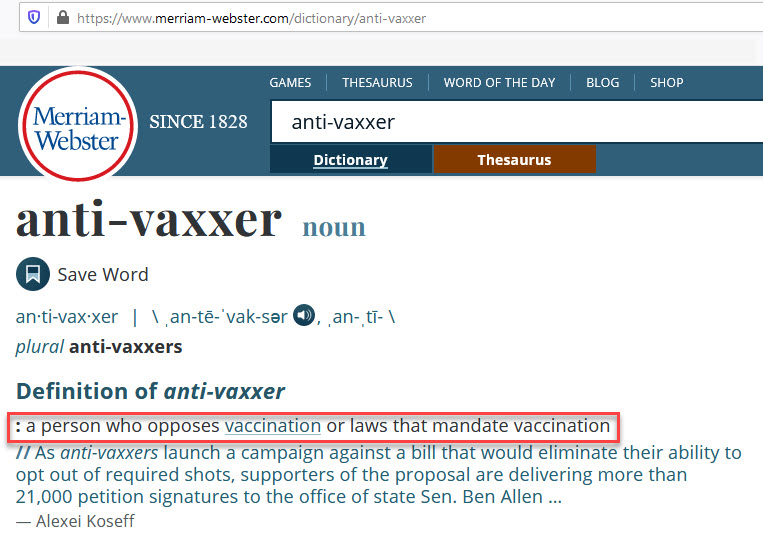Why I Prefer The Term Avaxxer
You have likely noticed how the media bandies around the term “anti-vaxxer”, but in many cases, this is a misnomer.
For a lot of parents, a more accurate term would be “ex-vaxxer” – because they trusted the medical profession, got their children vaccinated, and then discovered, the hard way, that those vaccines are not always as safe as they’d been told.
Further to that, some people are not necessarily opposed to vaccines – but they are against mandatory vaccines, which means they will still be labelled as “anti-vaxxers”. In fact, Merriam-Webster defines an anti-vaxxer as follows:
 |
Since it’s well known that vaccines can and do cause injury and death (just like pretty much every other drug), their argument, and it’s one I agree with, is that you should not be mandating any product that has a listed side-effect of death (however rare it may be).
By being in agreement with a mandatory vaccination policy, you’re essentially saying that you’re OK with random children being harmed, perhaps permanently, or killed.
You’re also giving up your rights to bodily autonomy.
It’s also worth bearing in mind that mandatory vaccination might not become a situation where you are held down by the police and injected against your will. It is likely to be more subtle than that – perhaps, you cannot obtain a driving licence or a plane ticket, or open a bank account, or get a job, unless you can prove you are up to date with all of the vaccinations you are told you need. In other words, life as you know it will not be easy, or even possible, unless you comply with the government’s demands.
And even if you have all of your vaccinations except just one, you are still technically classified as an anti-vaxxer by the government.
This point is not insignificant, given I’m writing this during the continued coronavirus scare, where surveys are showing that an increasing number of Americans say they will not get the COVID-19 vaccine when it’s available.
If this pans out as these polls show, then the number of “anti-vaxxers” in the USA is about to explode – and the reasons some of these people give for not wanting this latest vaccine, i.e. it’s not been tested adequately, actually apply to pretty much every vaccine on the CDC schedule (for both children and adults).
So, there are probably a lot of people, including doctors and nurses, who have questions about vaccines – are they safe and effective? – who may not identify as being against vaccines per se. It more likely simply means they want them to be safer and more effective.
Personally, I think the concept of a product you can take to prevent infection and disease has some merit, but the implementation of that idea has not been as great as you might imagine.
And, as more research is done, it turns out that some of the childhood infections that used to be common naturally, such as measles, may have benefits to the immune system as a whole – so perhaps even the concept isn’t as ironclad as I assumed.
But back to terminology.
In what other areas of life are people who ask important questions about things deemed “anti”?
So, if “anti-vaxxer” is not the best term, and “ex-vaxxer” is not always right either (because there are those who have never vaccinated themselves or their children but still oppose vaccines, especially mandatory ones), then what term should we use?
Well, I happen to like the word “avaxxer”.
It’s probable you’ve never seen this word before (if it’s even a word yet), so let me explain how I came up with it.
The word is constructed in the same way as the word “atheist”.
A theist is somebody who claims that one or more gods exist.
The “a” prefix simply means “without”, so an atheist is simply somebody who rejects that claim (i.e. “without belief”), usually on the basis of insufficient evidence. In other words, they are not yet convinced that the claim is true.
As an aside, note that atheists do not claim there are no gods – to do so would place the burden of proof on their shoulders, and in the context of gods and other supernatural beings, you cannot prove a negative. (See Russell’s Teapot for more information about this.)
So, in a similar vein, a vaxxer is somebody who claims (or believes) that “you can safely prevent disease and improve health by injecting a young child with bacteria or viruses (either live, attenuated, or dead), foreign proteins and human / animal DNA strands, known neurotoxins (e.g. aluminium, and mercury, in the form of thimerosal), carcinogens (e.g. formaldehyde, glyphosate), and other assorted chemicals (e.g. polysorbate 80), thus bypassing the body’s first line of defence and, in some cases, the protective blood / brain barrier.“
Therefore, an avaxxer is simply somebody who rejects the vaxxer’s claim, on the basis of insufficient evidence (that vaccines are safe and/or effective).
You’ll find some of the questions that appear to be inadequately answered, if at all, in this article, which is also the source of the above quote.